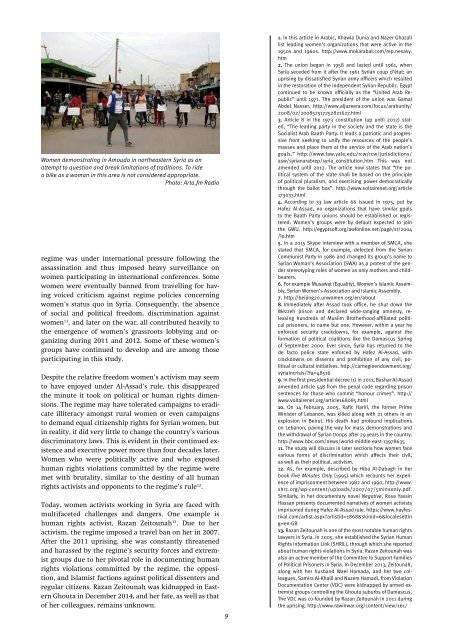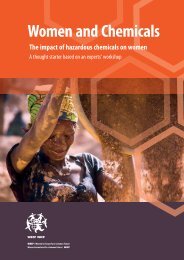future now”
YAO19
YAO19
Create successful ePaper yourself
Turn your PDF publications into a flip-book with our unique Google optimized e-Paper software.
Women demonstrating in Amouda in northeastern Syria as an<br />
attempt to question and break limitations of traditions. To ride<br />
a bike as a woman in this area is not considered appropriate.<br />
<br />
Photo: Arta.fm Radio<br />
regime was under international pressure following the<br />
assassination and thus imposed heavy surveillance on<br />
women participating in international conferences. Some<br />
women were eventually banned from travelling for having<br />
voiced criticism against regime policies concerning<br />
women’s status quo in Syria. Consequently, the absence<br />
of social and political freedom, discrimination against<br />
women 11 , and later on the war, all contributed heavily to<br />
the emergence of women’s grassroots lobbying and organizing<br />
during 2011 and 2012. Some of these women’s<br />
groups have continued to develop and are among those<br />
participating in this study.<br />
Despite the relative freedom women’s activism may seem<br />
to have enjoyed under Al-Assad’s rule, this disappeared<br />
the minute it took on political or human rights dimensions.<br />
The regime may have tolerated campaigns to eradicate<br />
illiteracy amongst rural women or even campaigns<br />
to demand equal citizenship rights for Syrian women, but<br />
in reality, it did very little to change the country’s various<br />
discriminatory laws. This is evident in their continued existence<br />
and executive power more than four decades later.<br />
Women who were politically active and who exposed<br />
human rights violations committed by the regime were<br />
met with brutality, similar to the destiny of all human<br />
rights activists and opponents to the regime’s rule 12 .<br />
Today, women activists working in Syria are faced with<br />
multifaceted challenges and dangers. One example is<br />
human rights activist, Razan Zeitounah 13 . Due to her<br />
activism, the regime imposed a travel ban on her in 2007.<br />
After the 2011 uprising, she was constantly threatened<br />
and harassed by the regime’s security forces and extremist<br />
groups due to her pivotal role in documenting human<br />
rights violations committed by the regime, the opposition,<br />
and Islamist factions against political dissenters and<br />
regular citizens. Razan Zeitounah was kidnapped in Eastern<br />
Ghouta in December 2014, and her fate, as well as that<br />
of her colleagues, remains unknown.<br />
9<br />
1. In this article in Arabic, Khawla Dunia and Nazer Ghazali<br />
list leading women’s organizations that were active in the<br />
1950s and 1960s. http://www.mokarabat.com/rep.nesasy.<br />
htm<br />
2. The union began in 1958 and lasted until 1961, when<br />
Syria seceded from it after the 1961 Syrian coup d’état; an<br />
uprising by dissatisfied Syrian army officers which resulted<br />
in the restoration of the independent Syrian Republic. Egypt<br />
continued to be known officially as the “United Arab Republic”<br />
until 1971. The president of the union was Gamal<br />
Abdel Nasser. http://www.aljazeera.com/focus/arabunity/<br />
2008/02/200852517252821627.html<br />
3. Article 8 in the 1973 constitution (up until 2012) stated,<br />
“The leading party in the society and the state is the<br />
Socialist Arab Baath Party. It leads a patriotic and progressive<br />
front seeking to unify the resources of the people’s<br />
masses and place them at the service of the Arab nation’s<br />
goals.” http://www.law.yale.edu/rcw/rcw/jurisdictions/<br />
asw/syrianarabrep/syria_constitution.htm This was not<br />
amended until 2012. The article now states that “the political<br />
system of the state shall be based on the principle<br />
of political pluralism, and exercising power democratically<br />
through the ballot box”. http://www.voltairenet.org/article<br />
173033.html<br />
4. According to 33 law article 66 issued in 1975, put by<br />
Hafez Al-Assad, no organizations that have similar goals<br />
to the Baath Party unions should be established or registered.<br />
Women’s groups were by default expected to join<br />
the GWU. http://egyptsoft.org/awfonline.net/page/sr/2004<br />
/lo.htm<br />
5. In a 2015 Skype interview with a member of SMCA, she<br />
stated that SMCA, for example, defected from the Syrian<br />
Communist Party in 1986 and changed its group’s name to<br />
Syrian Woman’s Association (SWA) as a protest of the gender<br />
stereotyping roles of women as only mothers and childbearers.<br />
6. For example Musawat (Equality), Women’s Islamic Assembly,<br />
Syrian Women’s Association and Islamic Assembly.<br />
7. http://beijing20.unwomen.org/en/about<br />
8. Immediately after Assad took office, he shut down the<br />
Mezzeh prison and declared wide-ranging amnesty, releasing<br />
hundreds of Muslim Brotherhood-affiliated political<br />
prisoners, to name but one. However, within a year he<br />
enforced security crackdowns, for example, against the<br />
formation of political coalitions like the Damascus Spring<br />
of September 2000. Ever since, Syria has returned to the<br />
de facto police state enforced by Hafez Al-Assad, with<br />
crackdowns on dissents and prohibition of any civil, political<br />
or cultural initiatives. http://carnegieendowment.org/<br />
syriaincrisis/?fa=48516<br />
9. In the first presidential decree (1) in 2011, Bashar Al-Assad<br />
amended article 548 from the penal code regarding prison<br />
sentences for those who commit “honour crimes”. http://<br />
www.voltairenet.org/article168085.html<br />
10. On 14 February, 2005, Rafic Hariri, the former Prime<br />
Minister of Lebanon, was killed along with 21 others in an<br />
explosion in Beirut. His death had profound implications<br />
on Lebanon, paving the way for mass demonstrations and<br />
the withdrawal of Syrian troops after 29 years in the country.<br />
http://www.bbc.com/news/world-middle-east-13978635<br />
11. The study will discuss in later sections how women face<br />
various forms of discrimination which affects their civil,<br />
as well as their political, activism.<br />
12. As, for example, described by Hiba Al-Dabagh in her<br />
book Five Minutes Only (1995) which recounts her experience<br />
of imprisonment between 1982 and 1990, http://www.<br />
shrc.org/wp-content/uploads/2007/07/5minsonly.pdf.<br />
Similarly, in her documentary novel Negative, Rosa Yassin<br />
Hassan presents documented narratives of women activists<br />
imprisoned during Hafez Al-Assad rule. https://www.hayfestival.com/artist.aspx?artistid=1868&skinid=6&localesettin<br />
g=en-GB<br />
13. Razan Zeitounah is one of the most notable human rights<br />
lawyers in Syria. In 2005, she established the Syrian Human<br />
Rights Information Link (SHRIL), through which she reported<br />
about human rights violations in Syria. Razan Zeitounah was<br />
also an active member of the Committee to Support Families<br />
of Political Prisoners in Syria. In December 2013, Zeitounah,<br />
along with her husband Wael Hamada, and her two colleagues,<br />
Samira Al-Khalil and Nazem Hamadi, from Violation<br />
Documentation Center (VDC) were kidnapped by armed extremist<br />
groups controlling the Ghouta suburbs of Damascus.<br />
The VDC was co-founded by Razan Zeitounah in 2011 during<br />
the uprising. http://www.rawinwar.org/content/view/161/



